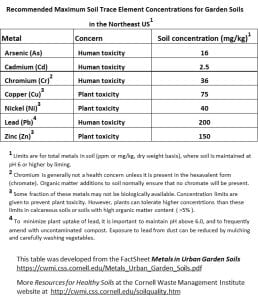The Cornell Soil Health Laboratory offers Soil Heavy Metal Tests for $80 per sample. ($70 for those paying with Cornell accounts.)
Our heavy metal test includes these elements:
- Arsenic (As)
- Cadmium (Cd)
- Chromium (Cr)
- Copper (Cu)
- Lead (Pb)
- Nickel (Ni)
- Zinc (Zn)
We ‘digest’ the soil following the EPA 3050B method to release the heavy metals for analysis. We measure their concentrations and report their levels in parts per million (ppm).
Find more information on how to sample your soil and interpret your results in our factsheets and other resources linked below.
More information
- Heavy Metal Contamination factsheet – Cornell Soil Health Lab
- Soil Sampling Guide for Heavy Metal Contamination factsheet – Cornell Soil Health Lab
- Metals in Urban Garden Soils – Cornell eCommons
- Heavy Metal Analysis Submission form
Heavy metals in soil can adversely affect plant growth as well as human health, depending on the levels of contamination.
Soils can be contaminated by human activities, including nearby heavy auto traffic, lead-based paint flakes, industrial or commercial activities, spills, or residues from applications of pesticides containing heavy metals. Because heavy metals can persist in soil, the contamination does not need to be recent.
Recommended Maximum Soil Trace Element Concentrations for Garden Soil in the Northeast US
 Click on table for larger version
Click on table for larger version
Community Gardens Soil Testing Program
For 2024, the New York State Department of Agriculture and Markets (NYSDAM) invites eligible organizations to apply for community garden soil testing through the New York State Community Gardens Soil Testing Program. In addition to heavy metals, we also report soil pH, major soil nutrients, and percent organic matter.
Garden specialists from Cornell Cooperative Extension Harvest New York will provide technical support and education for participating gardens to help interpret the results and suggest ways to address potential contamination and improve soil for better crops.
Details, application and contact information:


